First Starts for Quarterbacks Drafted No. 1 Overall

First Starts for Quarterbacks Drafted No. 1 Overall
Terry Bradshaw (1970)
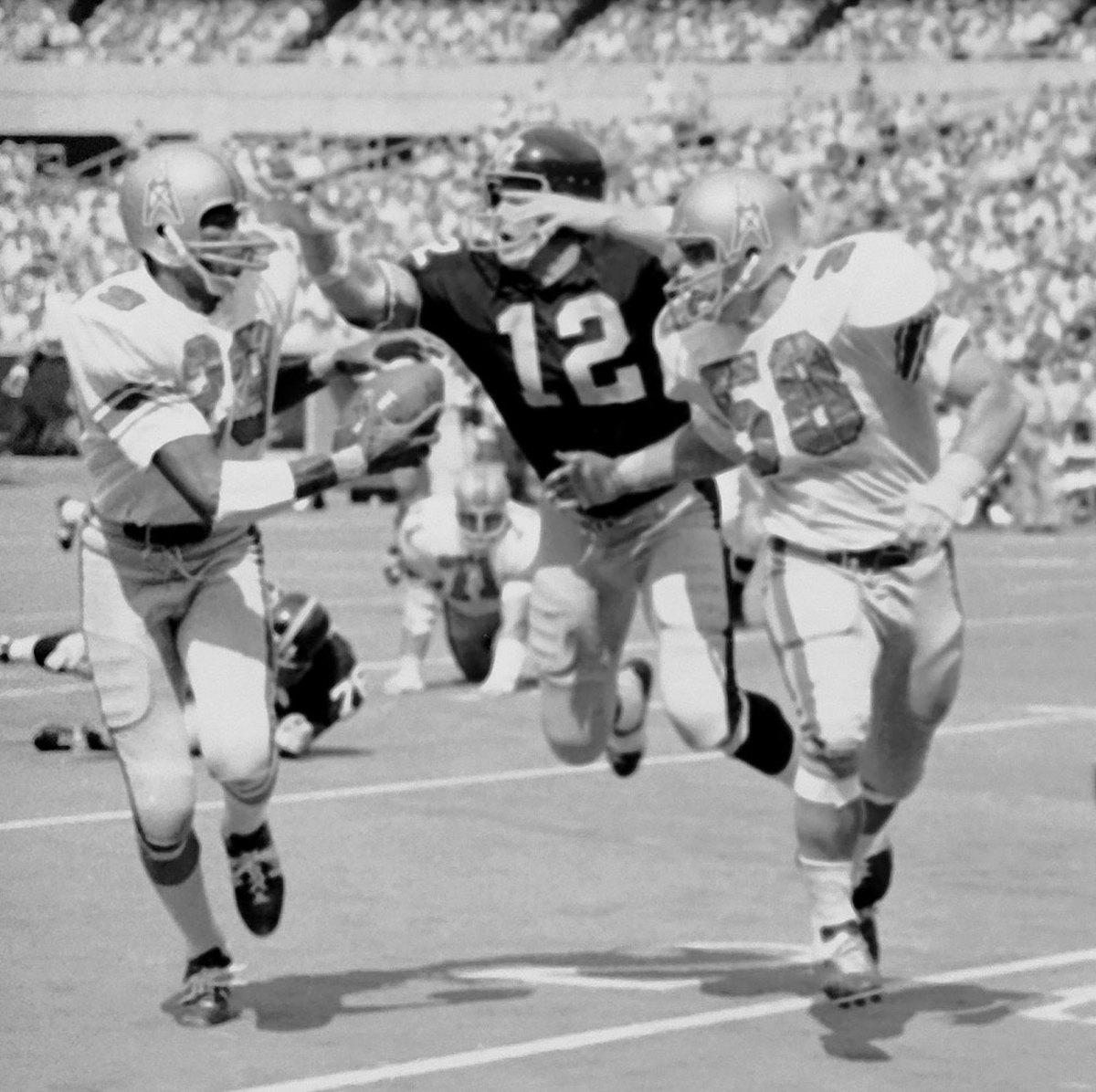
Bradshaw had double the pressure in his first career start. Not only did he start the Steelers’ first game in 1970 after being drafted No. 1 overall that spring, he also started the first ever regular season game at Three Rivers Stadium. Christening the Steelers’ new home did not go well for Bradshaw, who completed only four of his 16 passes for 70 yards, no touchdowns and an interception. He was replaced mid-game by Terry Hanratty, and Steelers lost to the Houston Oilers 19-7.
Jim Plunkett (1971)
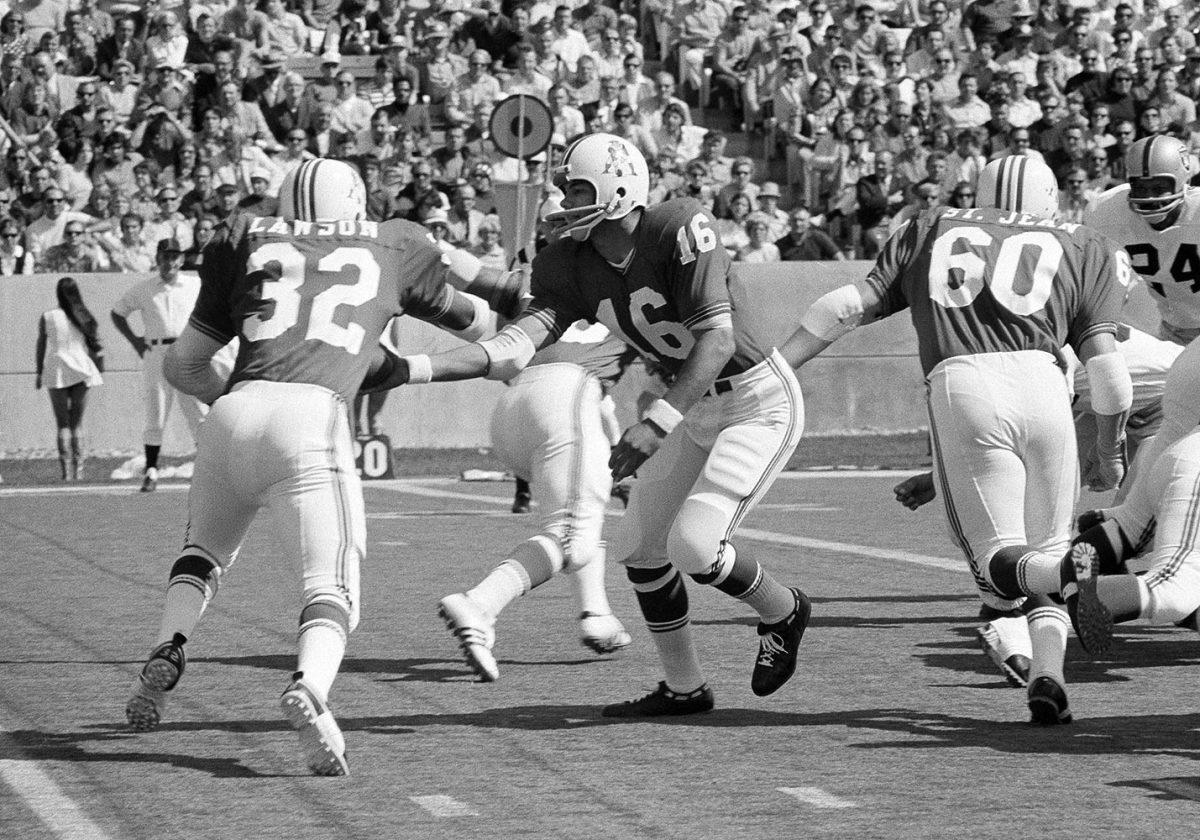
After trailing 6-0 at halftime in the Patriots’ 1971 season opener, Jim Plunkett turned the tide in his first NFL start by tossing two third quarter touchdowns. New England rallied to beat Oakland 20-6, with Plunkett throwing for 127 yards, two touchdowns and an
Steve Bartkowski (1975)
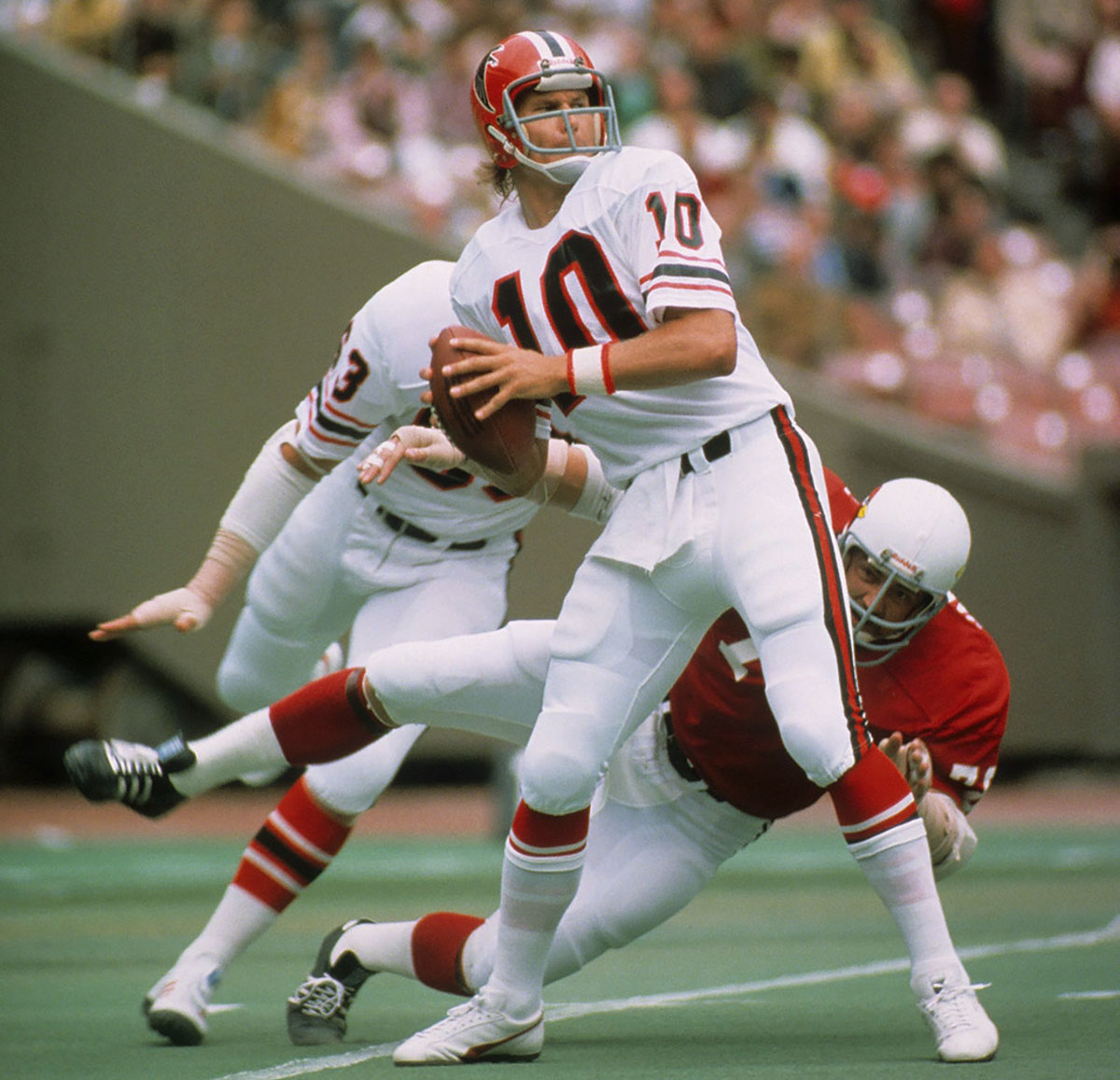
Bartkowski took the Falcons’ quarterback reigns to begin the 1975 season, with his first career start coming against the St. Louis Cardinals. He scored on a first quarter touchdown run, but failed to find the end zone via the pass. Bartkowski completed eight of his 16 passes for 81 yards and an interception in a 23-20 loss to the Cardinals.
John Elway (1983)
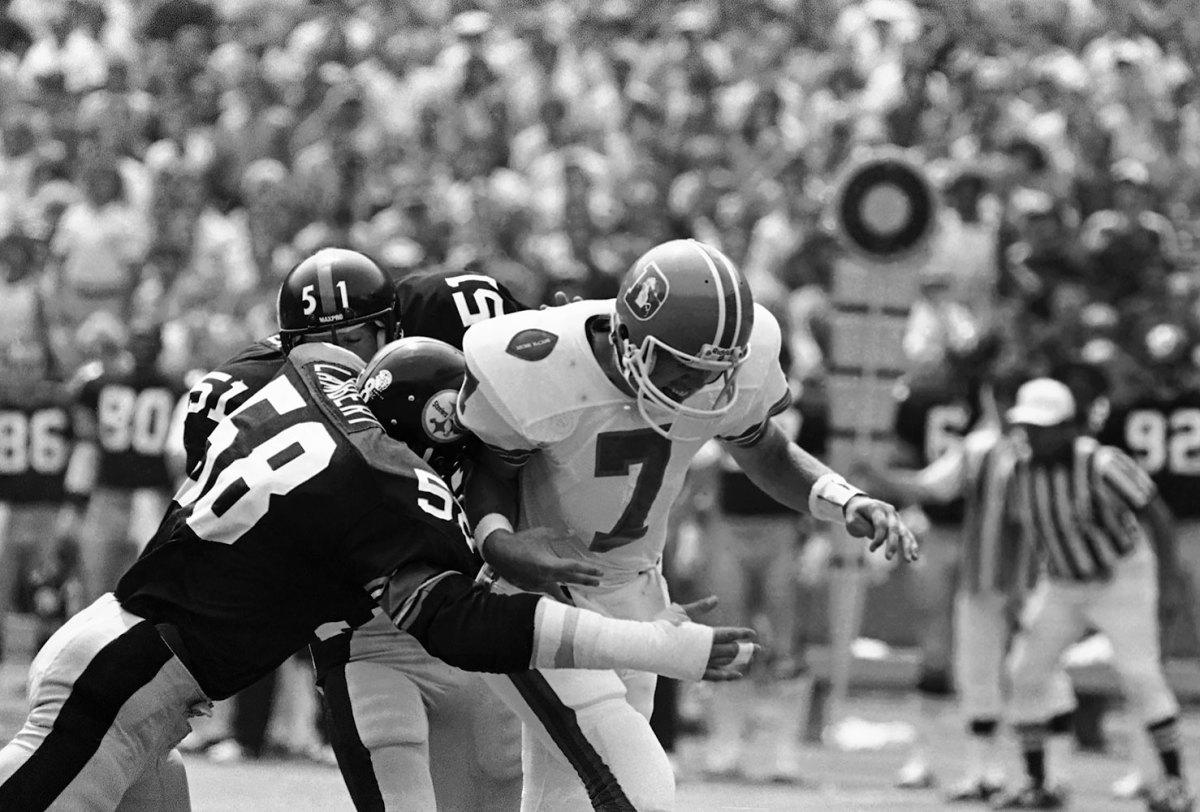
It’s easy to remember Elway’s final NFL start: a triumphant performance for the Broncos in Super Bowl XXXIII, where he threw for 336 yards and won Super Bowl MVP honors before riding off into the sunset. Elway’s first career start couldn’t have been more different. In the Broncos’ 1983 season opener against Pittsburgh, Elway completed one of his eight passes for 14 yards and an interception, with the Steelers sacking him four times. Veteran Steve DeBerg took over late in the game, and would take over the Broncos’ starting job later in the season until a shoulder injury gave Elway another chance to prove himself.
Vinny Testaverde (1987)
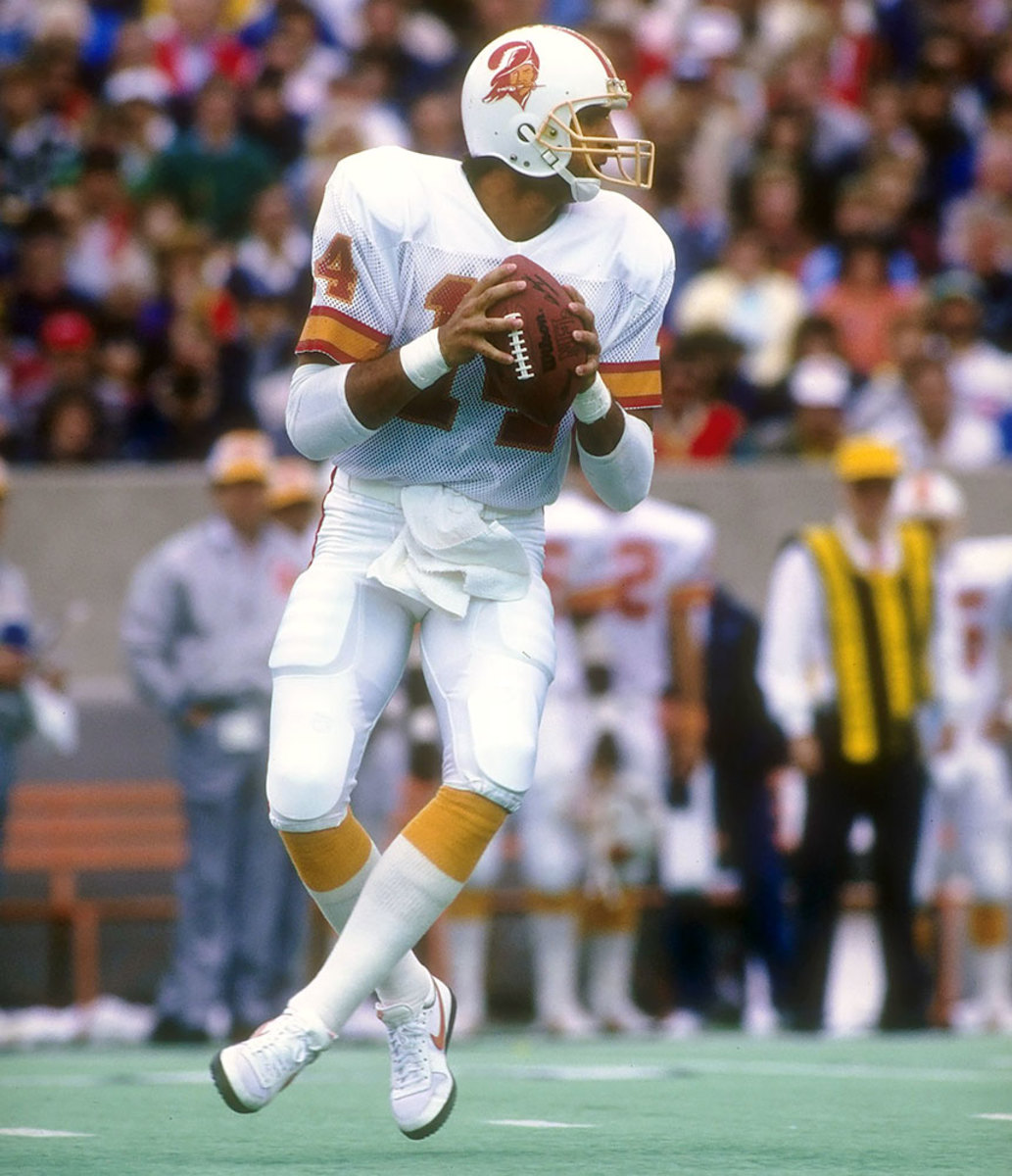
After giving way to a future legend in John Elway, Steve DeBerg would see another No. 1 overall pick supplant him four years later. Vinny Testaverde took over for DeBerg and the Buccaneers late in the 1987 season, but had a mediocre first start. Testaverde completed 22 of his 47 passes for 369 yards, two passing touchdowns and a rushing touchdown. He also threw two interceptions and was sacked three times, however, as Tampa Bay lost 44-34 to New Orleans. The journeyman quarterback spent his first six years with the Bucs, the first of seven NFL teams he would play for.
Troy Aikman (1989)
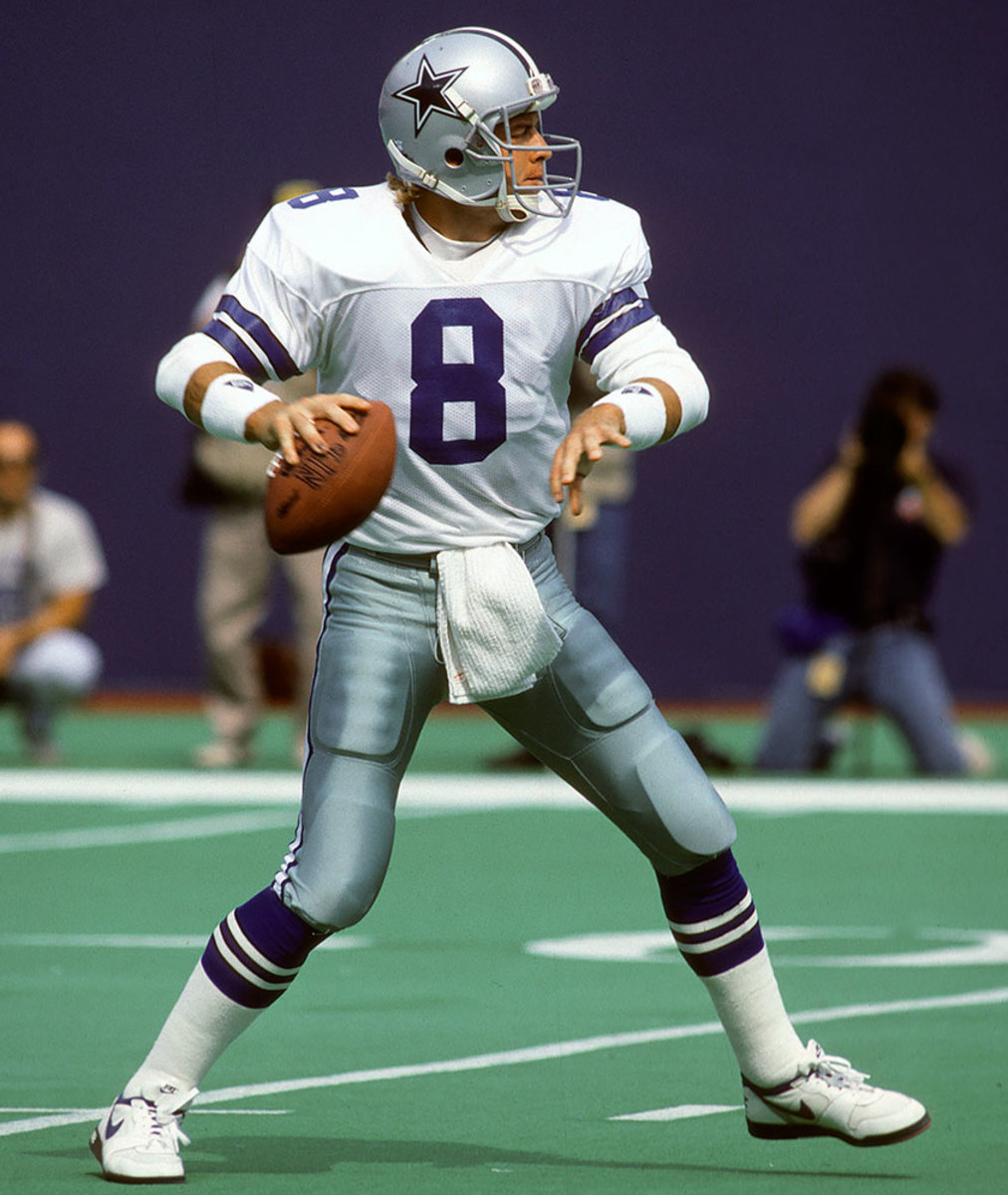
It’s unlikely that anyone who watched Aikman’s first career start, or his any of his rookie season, predicted then that the Cowboys quarterback would eventually make the Hall of Fame. Aikman made his debut in the 1989 season opener against New Orleans, going 17-of-35 for 180 yards and two interceptions. The Saints shut out the Cowboys 28-0, and Aikman continued to struggle after that. He finished the year with an 0-11 record as a starter, tossing 18 interceptions and only nine touchdowns in the process.
Jeff George (1990)
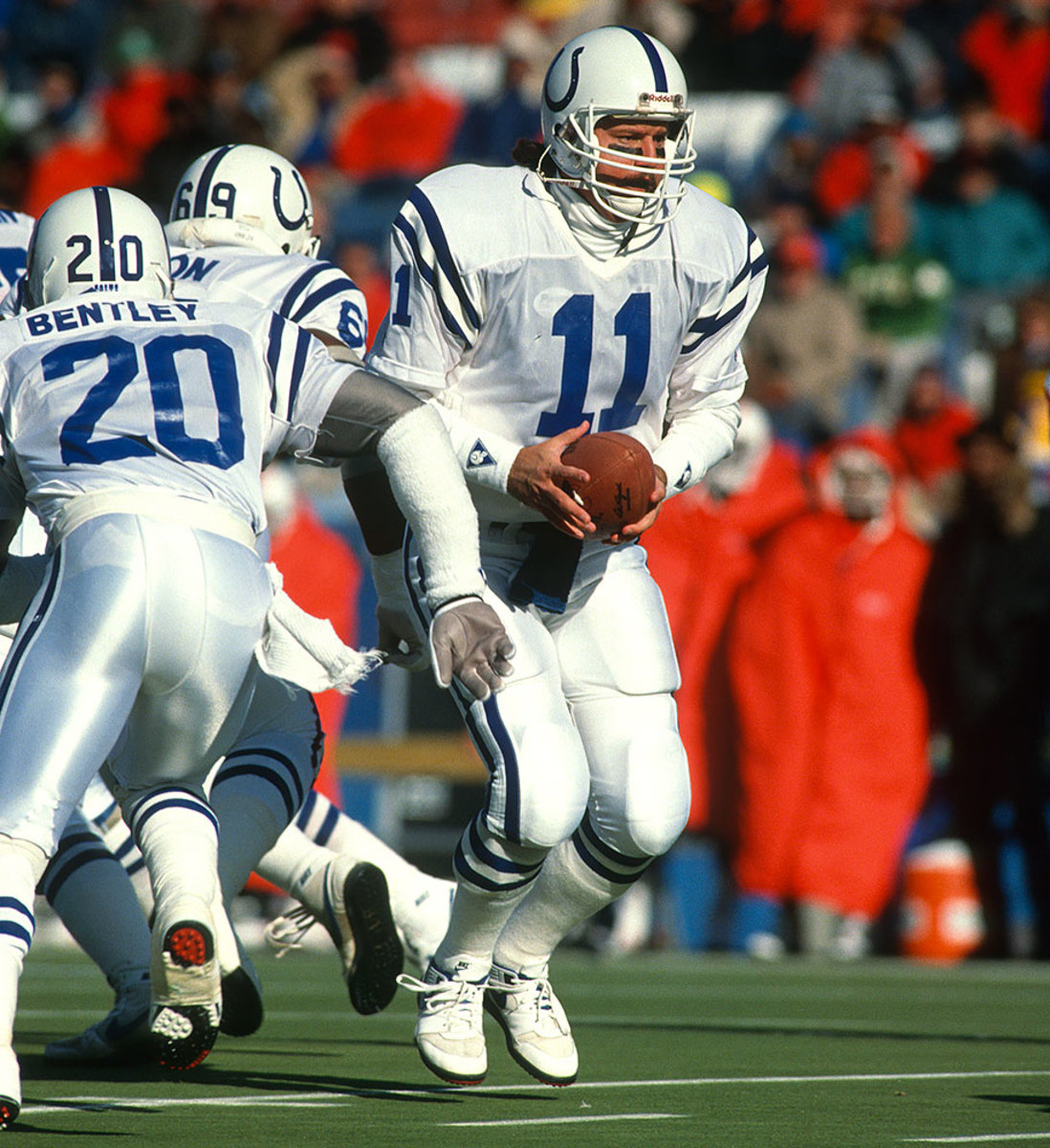
George, an Indianapolis native, had a largely uninspiring tenure with the Colts to begin his career, but his first NFL start was surprisingly solid. In a losing effort against the Buffalo Bills in the 1990 season opener, George threw for 160 yards and a touchdown, without turning the ball over. The Colts couldn’t find their way with George under center, however, going 5-7 in games he started during his rookie season and 1-15 the following year. George went 14-35 as a starter in four seasons with the Colts.
Drew Bledsoe (1993)
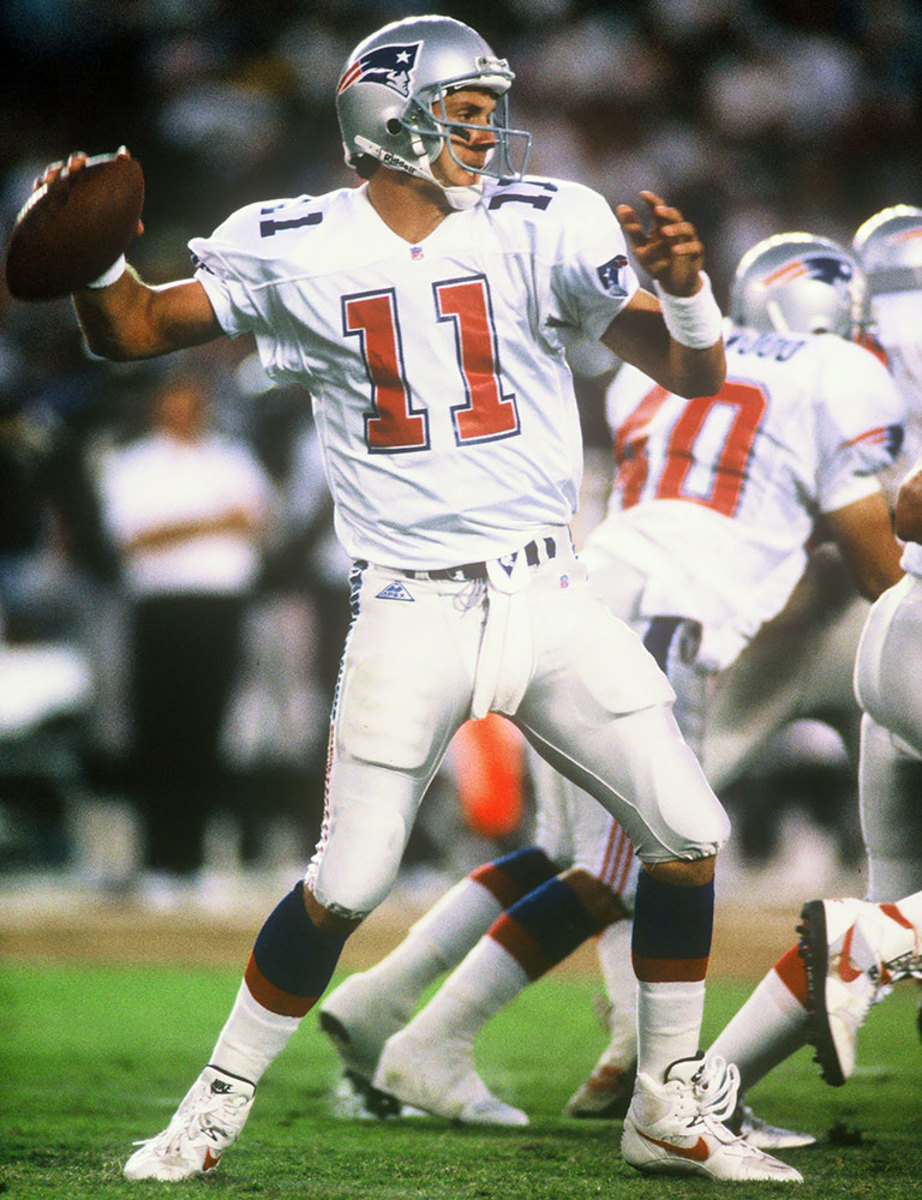
Although he made his first Pro Bowl in just his second season, Bledsoe’s first career start was rather pedestrian. Bledsoe and the Patriots began the 1993 season in Buffalo, where the quarterback went 14-of-30 for 148 yards, two touchdowns and an interception. It wasn’t enough, as Jim Kelly and the Bills emerged with a 38-14 victory. Bledsoe threw 15 touchdowns in his rookie season and 166 total during his nine years with New England.
Peyton Manning (1998)
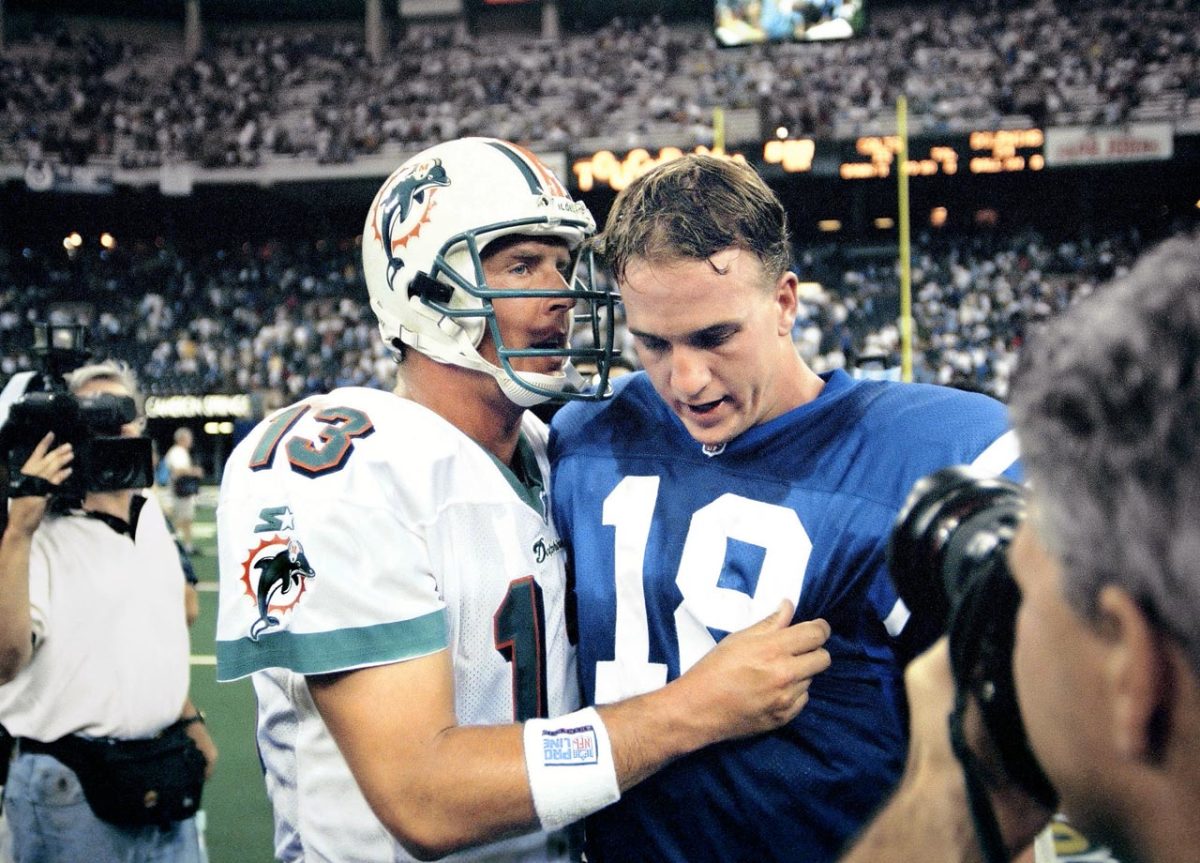
How exactly did “The Sheriff” open his pro career in a matchup with none other than Dan Marino? Manning was a bit rattled in his first career start despite throwing for 302 yards and a touchdown. He also had a trio of interceptions and was sacked four times. Marino, meanwhile, led the Dolphins to a 24-15 victory in Indianapolis.
Tim Couch (1999)
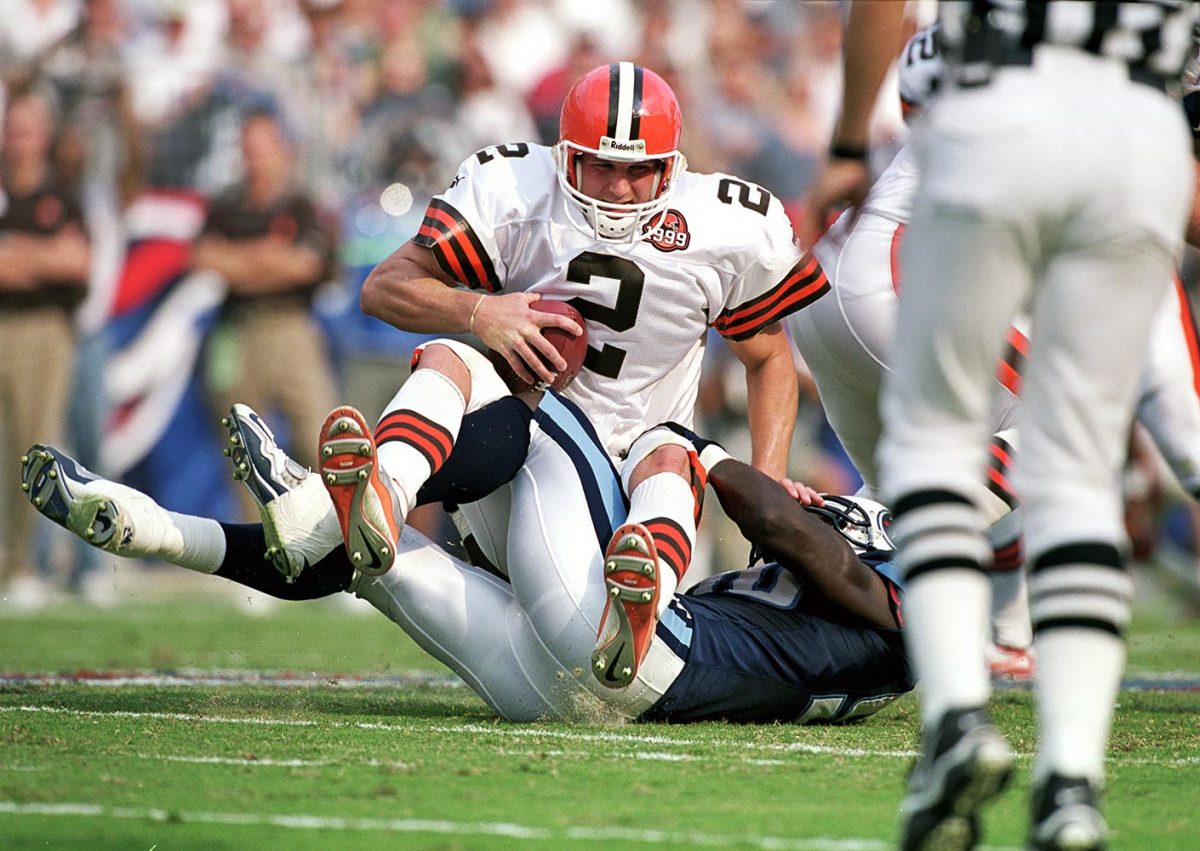
Couch faced lofty expectations as the No. 1 overall pick in Cleveland, but never came close to living up to his potential. Taking over as the starting quarterback in the Browns’ second game of the 1999 season, Couch turned in the first of many unimpressive performances. He completed 12 of 24 passes for 134 yards and a touchdown, but also suffered seven sacks, including one for a safety. Cleveland’s offense struggled in a 26-9 loss to the Titans in Nashville, an inauspicious start for Couch in what would be a disappointing five-year career.
Michael Vick (2001)
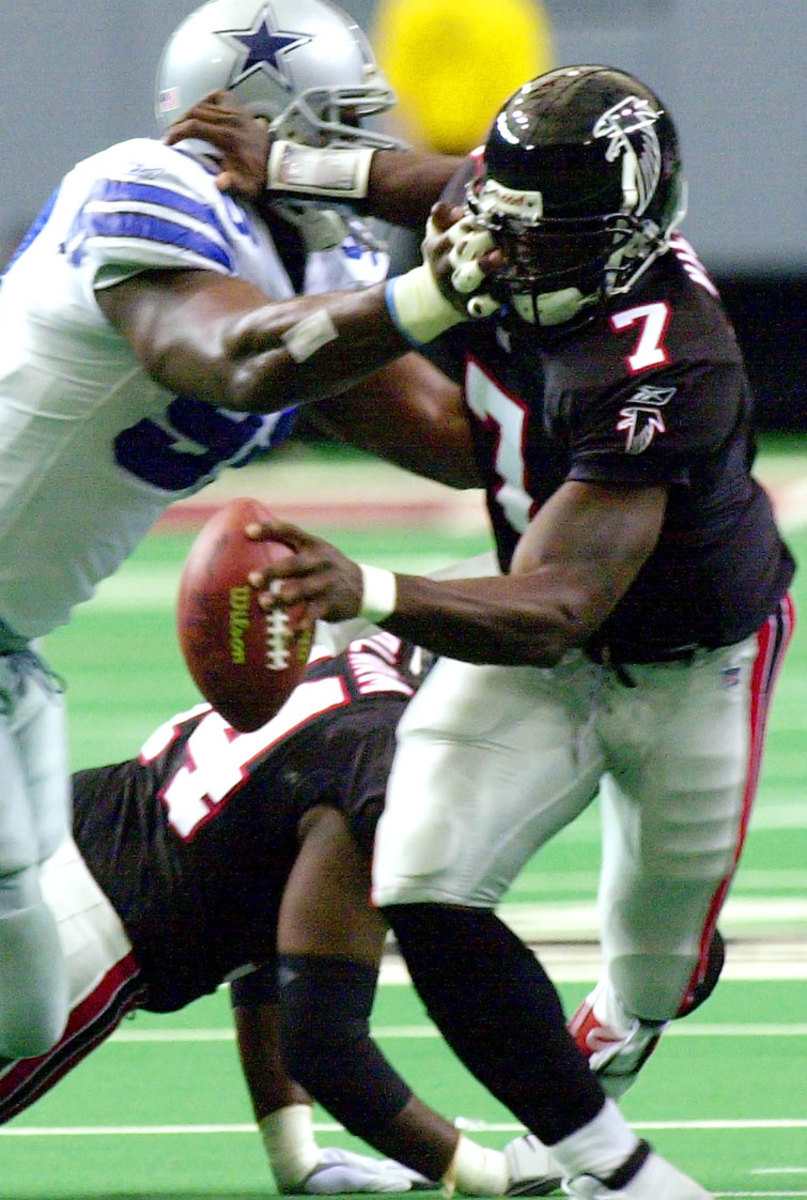
Before he became one of the league’s scintillating stars, Vick had a relatively modest start to his career. Vick’s first NFL start came midway through the 2001 season against the Dallas Cowboys. He leaned heavily on running back Maurice Smith, who carried 27 times for 148 yards. In the passing game, Vick was quiet but mistake-free, completing four of his 12 passes for 32 yards and a touchdown. The Falcons beat draft bust Ryan Leaf and the Cowboys 20-13, and Vick became the first quarterback drafted No. 1 overall to win his first career start since Jim Plunkett did so 30 years earlier.
David Carr (2002)
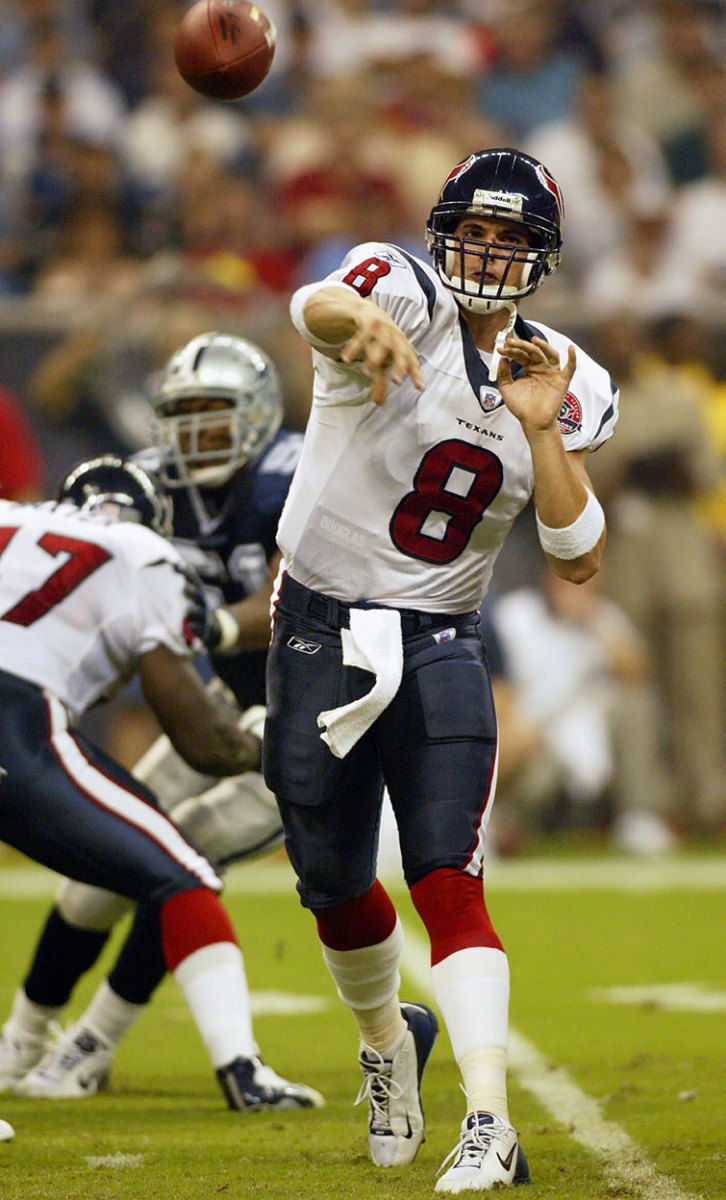
Carr’s first career start had some high stakes: the first game in Houston Texans franchise history, at home against the in-state rival Dallas Cowboys. And for the most part, he delivered. Carr went 10-for-22 for 145 yards, two touchdowns and an interception. More importantly, he led the Texans to a 19-10 win, good for the franchise’s first win and bragging rights in a state where football is king. Carr would spend five years in Houston, going only 22-53 as a starter. His NFL debut, however, will be a part of Texans lore for a long time.
Carson Palmer (2003)
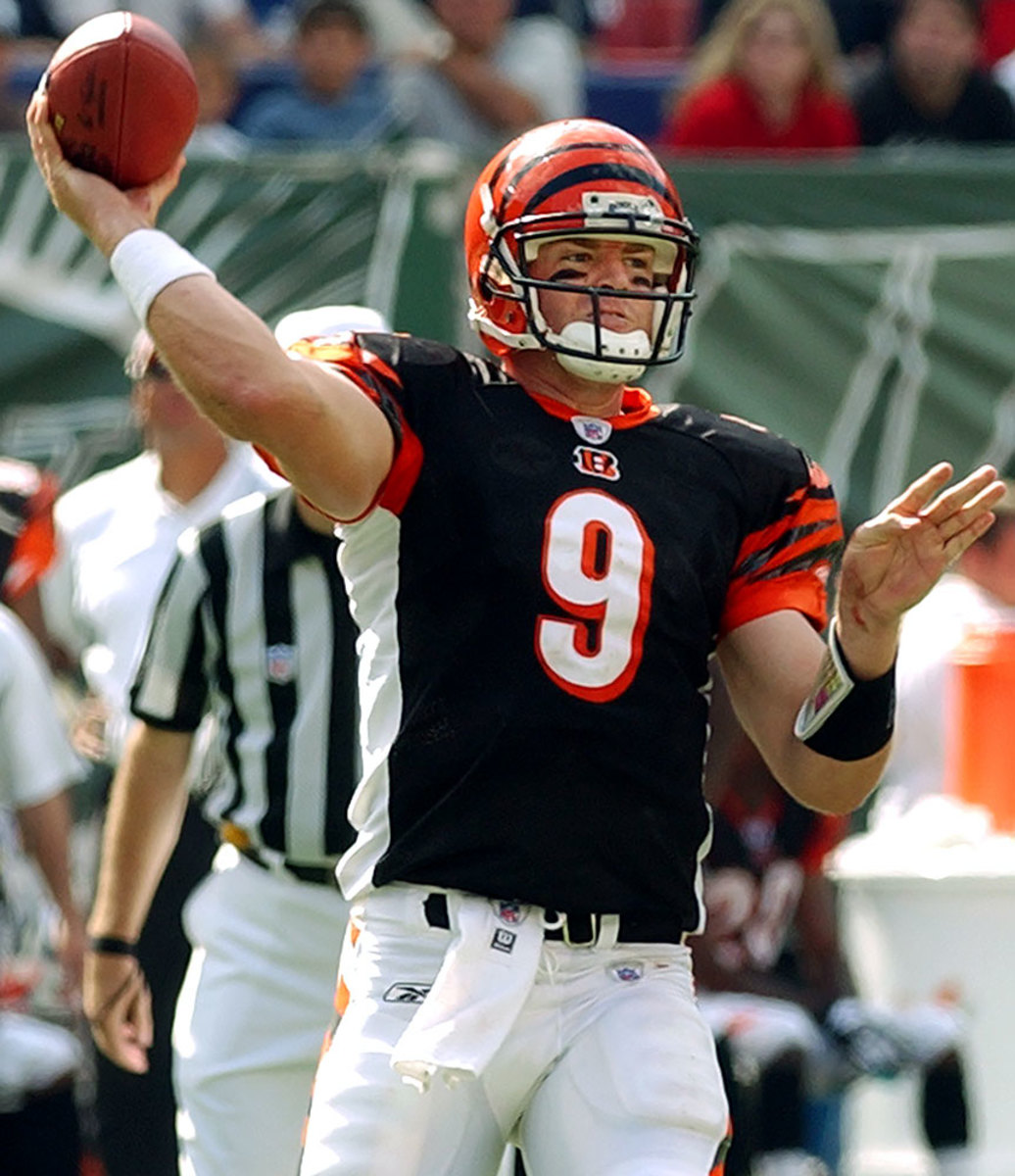
Unlike many of the quarterbacks drafted No. 1 overall, Palmer spent his entire rookie season on the bench. He got his first opportunity to start in the Bengals’ 2004 season opener at the Meadowlands, where he threw for 248 yards, two touchdowns and an interception against the Jets. New York won the game 31-24, but it would be the beginning of a productive career for Palmer. He threw a league-best 32 touchdowns in 2005 and only Ken Anderson and Boomer Esiason have more passing yards and touchdowns in Bengals franchise history. Despite his success, Palmer failed to win a playoff game in his eight years with Cincinnati.
Eli Manning (2004)
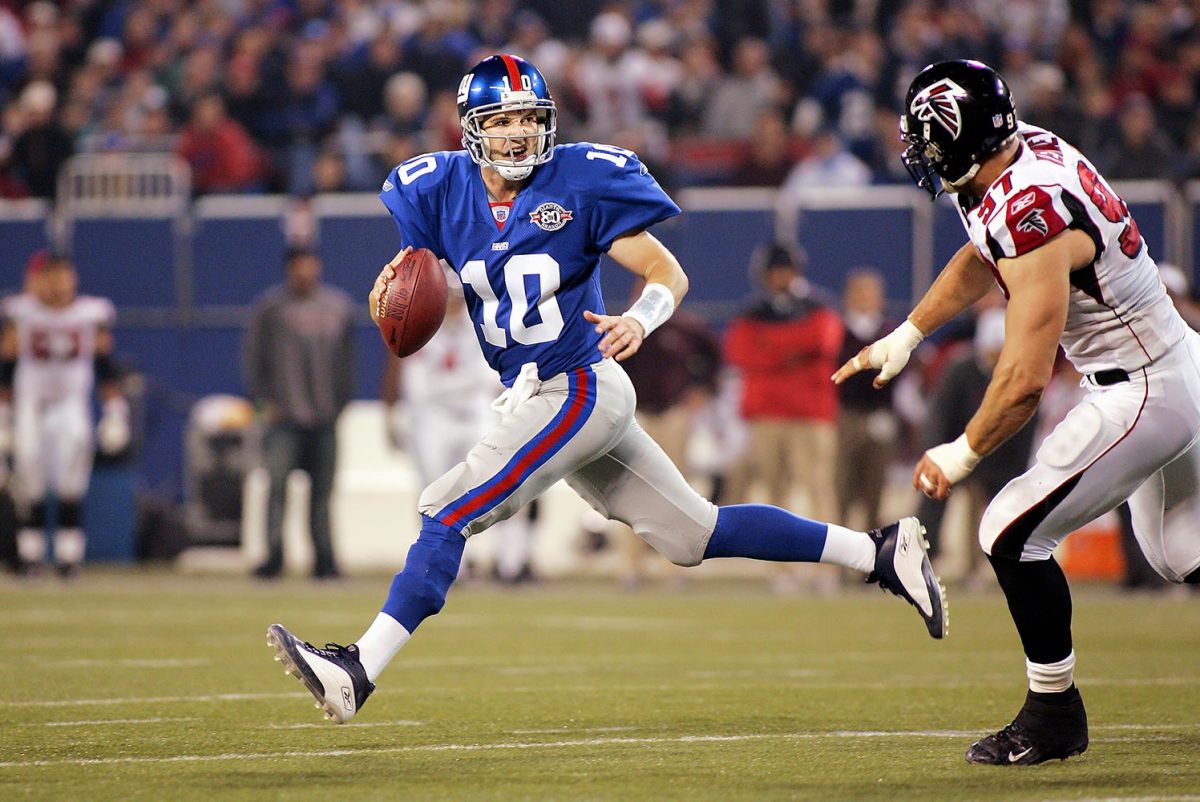
Before his two Super Bowl titles in New York, Manning had to battle Kurt Warner for the Giants’ starting job. Manning finally got his chance midway through his rookie season against the Atlanta Falcons, though the initial results were shaky. In his first career start, Manning completed 17 of his 37 passes for 162 yards, a touchdown and two interceptions in a 14-10 loss. A few weeks later, the growing pains continued as Manning recorded a 0.0 passer rating against Baltimore in his fourth career start. The script flipped after that. Manning led the Giants to the playoffs in only his second year, and already has a couple of Super Bowl rings to his name. Safe to say he ditched the “Peyton’s little brother” moniker pretty quickly.
Alex Smith (2005)
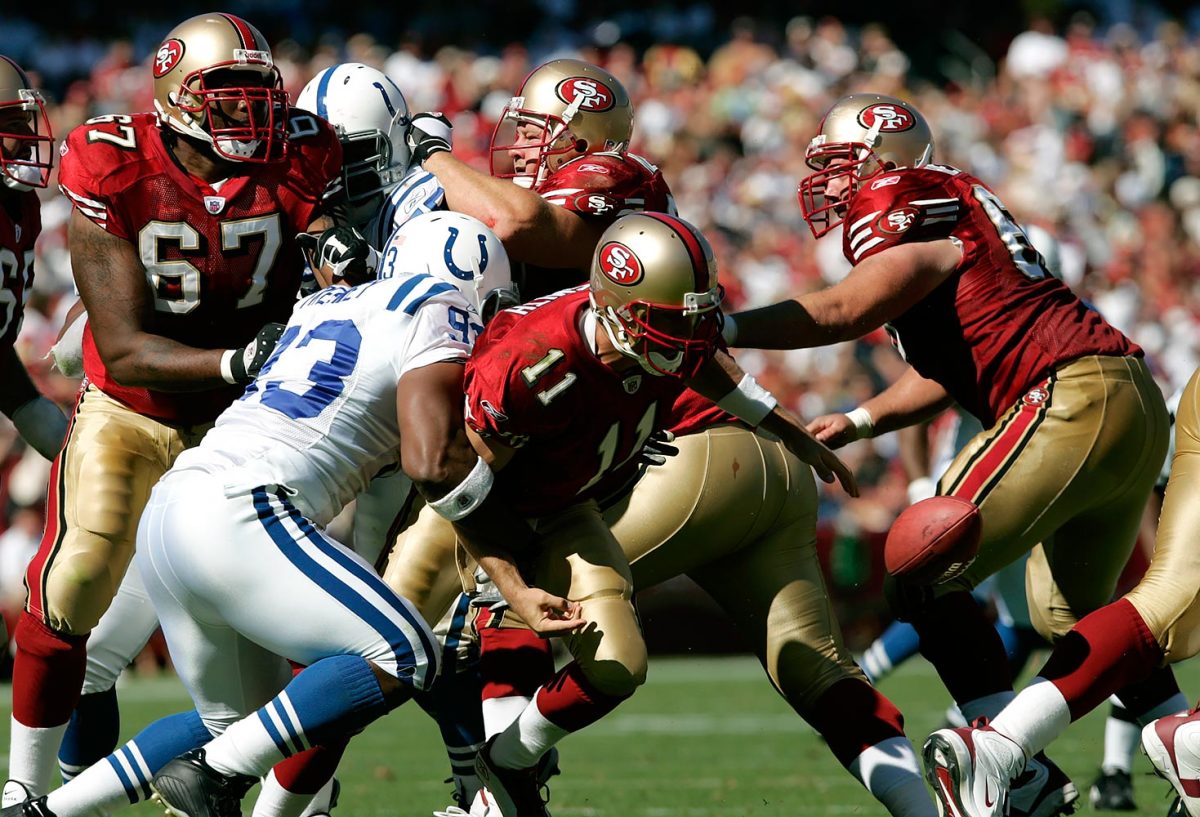
Smith’s first career start couldn’t have been much worse. Going head-to-head with a quarterback legend in Peyton Manning, Smith completed only nine of 23 passes for a meager 74 yards, threw four interceptions and lost a fumble. He was also sacked five times as Indianapolis rolled, 28-3. Labeled as a bust for the early part of his career, Smith would eventually find his rhythm under coach Jim Harbaugh, leading the 49ers to the NFC Championship Game in 2012. The rise of Colin Kaepernick in San Francisco pushed Smith to Kansas City, where he’s posted a 36-18 record as a starter despite ho hum yardage and touchdown totals.
JaMarcus Russell (2007)
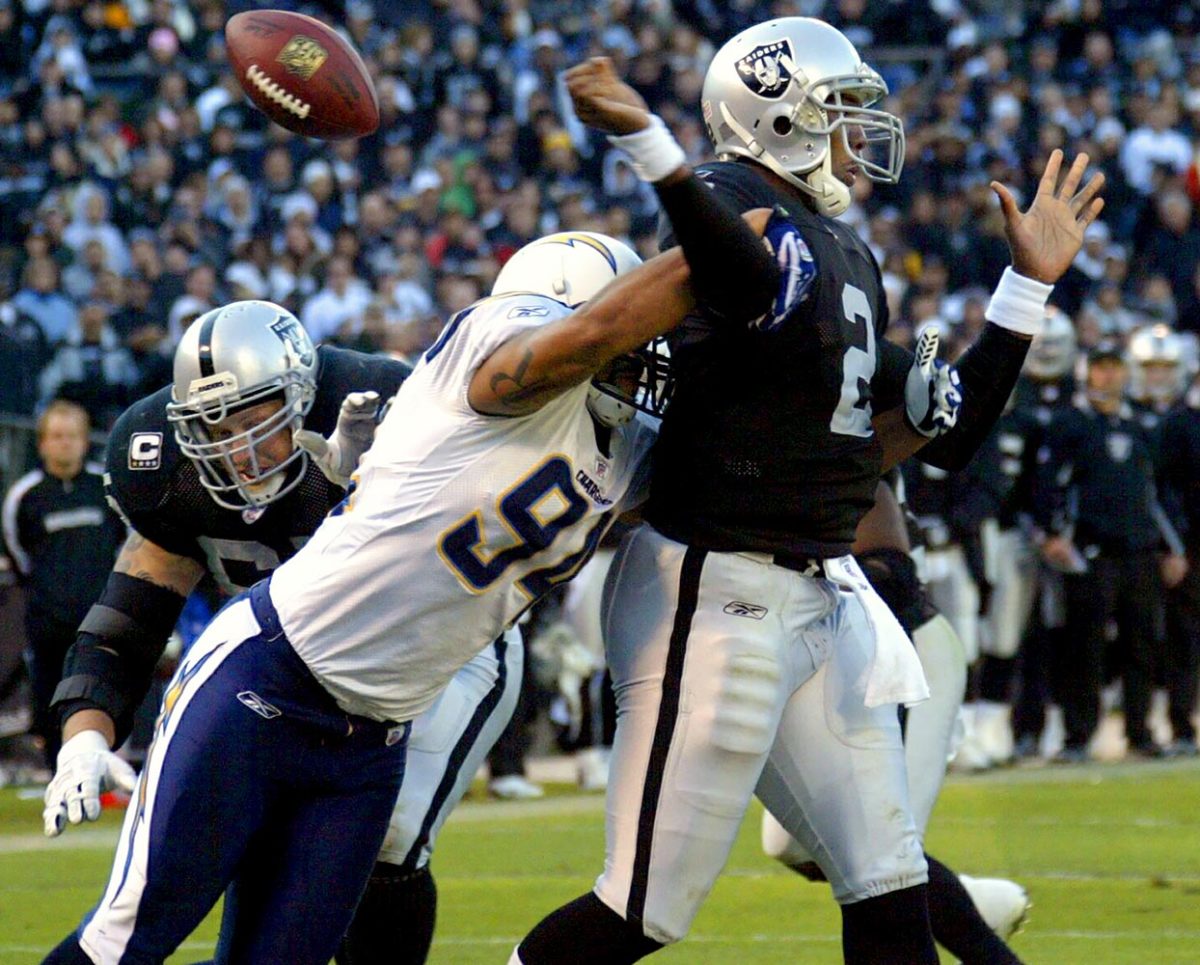
Although Russell had a short and disastrous career in Oakland, he showed flashes of potential in his first career start, which came in the Raiders’ 2007 regular season finale. Against the playoff-bound Chargers, Russell went 23-of-31 for 224 yards, a touchdown, an interception and a lost fumble. It seemed like a nominal improvement for Russell after he struggled playing in a relief role at quarterback in the previous weeks. Things only got worse for Russell from there. The heralded LSU product threw more interceptions than touchdowns in the following two years, was benched in 2009 and cut soon after that season. He’ll go down as one of the worst top NFL draft choices of all time.
Matthew Stafford (2009)
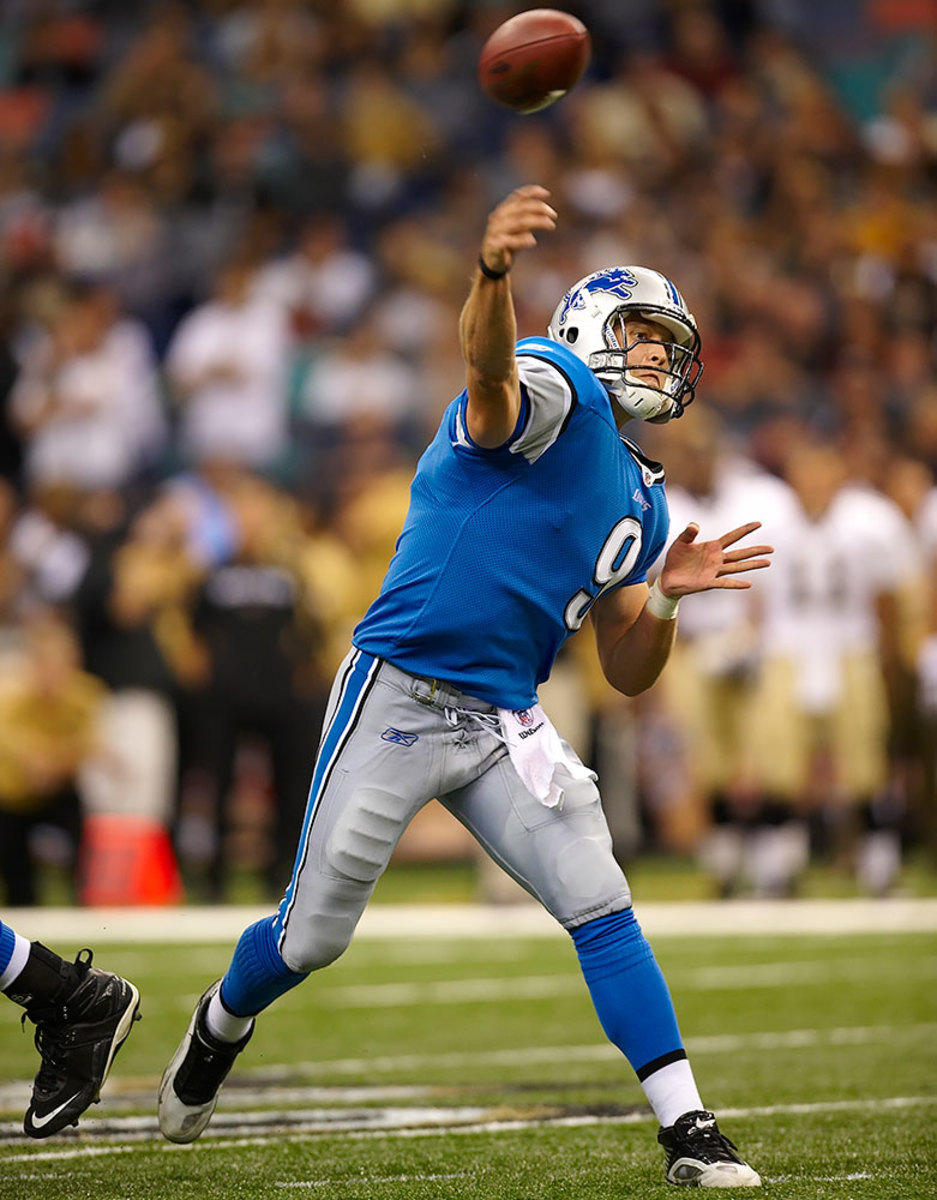
Stafford’s first NFL start was inconsistent, and it didn’t help that his opponent was the ever-dangerous Drew Brees. Stafford was 16 of 37 for 205 yards and three interceptions, as the Lions fell 45-27 in New Orleans. Brees, meanwhile, threw for 358 yards and six touchdowns in that game. Coincidentally, Stafford returned to New Orleans to face Brees and the Saints in his first career playoff game two years later. The Lions lost again, by nearly the same exact score (45-28).
Sam Bradford (2010)
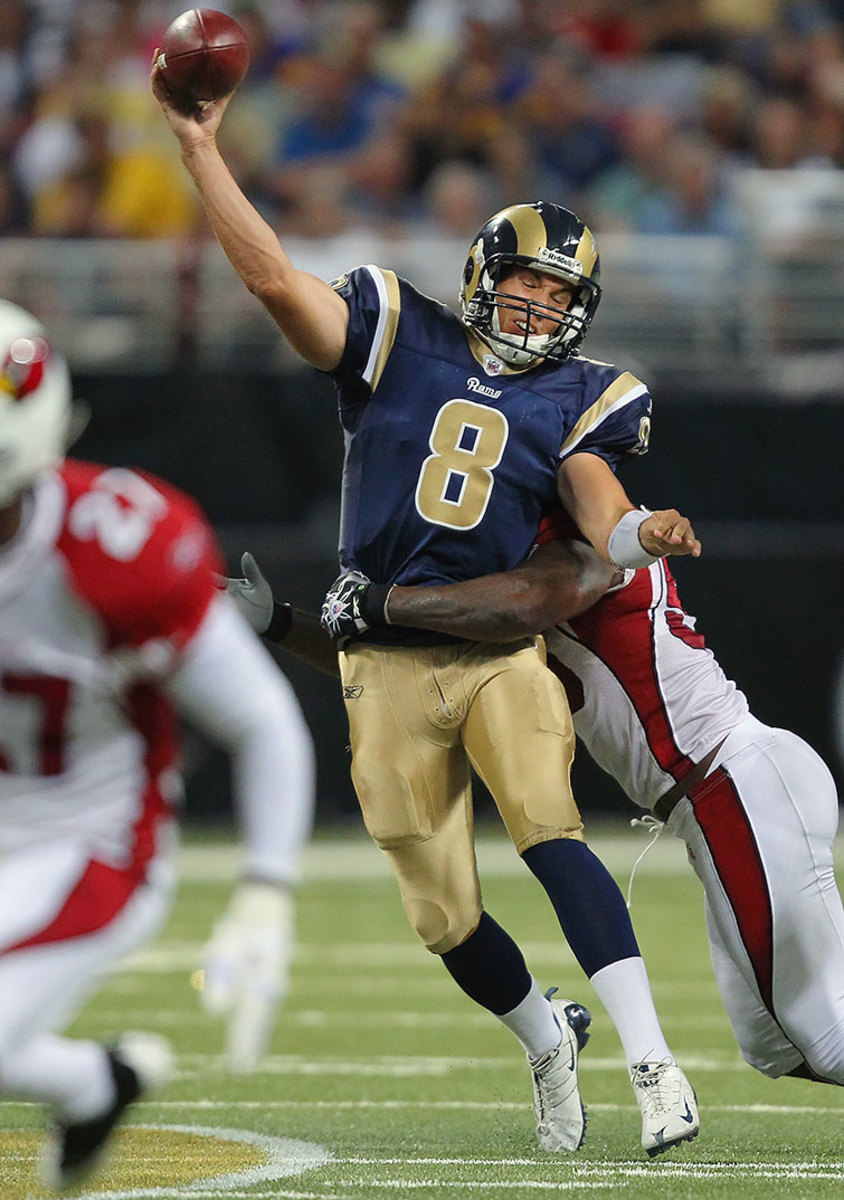
The former Heisman winner couldn’t end the St. Louis Rams’ woes against division opponents in his first career start, losing 17-13 to the Arizona Cardinals in the 2010 season opener. Bradford threw a whopping 55 passes in his debut, completing 32 of them. He finished the game with 253 passing yards, a touchdown and three interceptions. Bradford went 7-9 as a starter in his rookie season, throwing 18 touchdowns and 15 interceptions. His time in St. Louis was largely disappointing, as Bradford won only 18 games with the Rams in four years as a starter.
Cam Newton (2011)
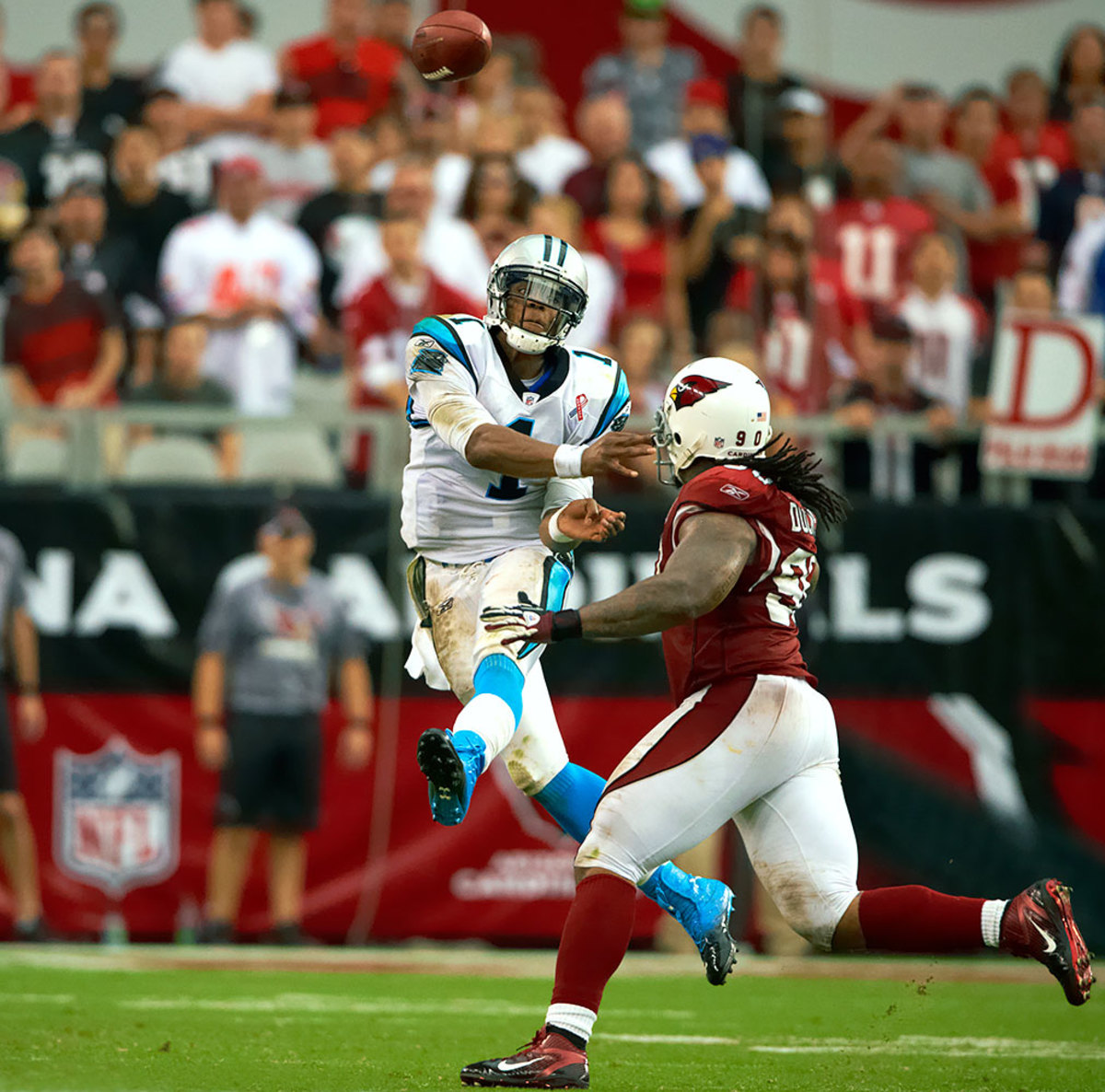
Newton didn’t have the struggles many other quarterbacks had in their first career starts. The Panthers quarterback was astonishing in his league debut, throwing for 422 yards (the most ever by a rookie in his first game), two touchdowns and an interception. Newton added a rushing touchdown as well, but Carolina fell 28-21 to Arizona in the 2011 regular season opener. It was the start of Newton’s NFL stardom, culminating in a league MVP award in 2015. Newton and the Panthers exercised some demons in the playoffs last year, emphatically beating the Cardinals to win the NFC and head to Super Bowl 50.
Andrew Luck (2012)
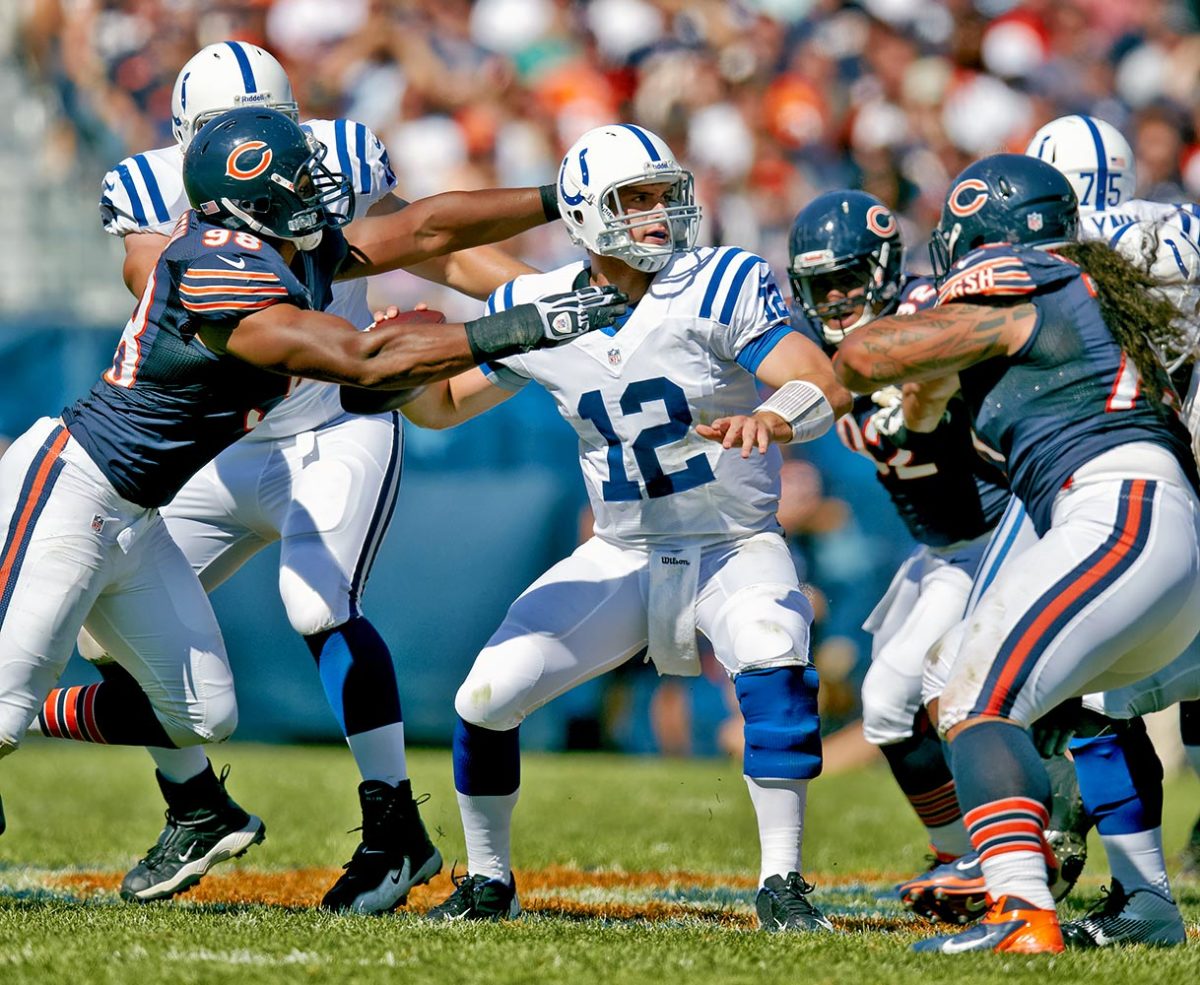
The Stanford standout had a rough first start as a pro, throwing three interceptions in a 41-21 loss to the Bears in Chicago. Luck threw for 309 yards and found Donnie Avery for his first career touchdown, but was largely overmatched in his NFL debut. The Colts’ fortunes would improve that season, however, with Luck leading the team to 11 victories and a Wild Card berth in his rookie season. The jury is still out on whether he can lead the Colts to the same greatness that they enjoyed with Peyton Manning at quarterback.
Jameis Winston (2015)
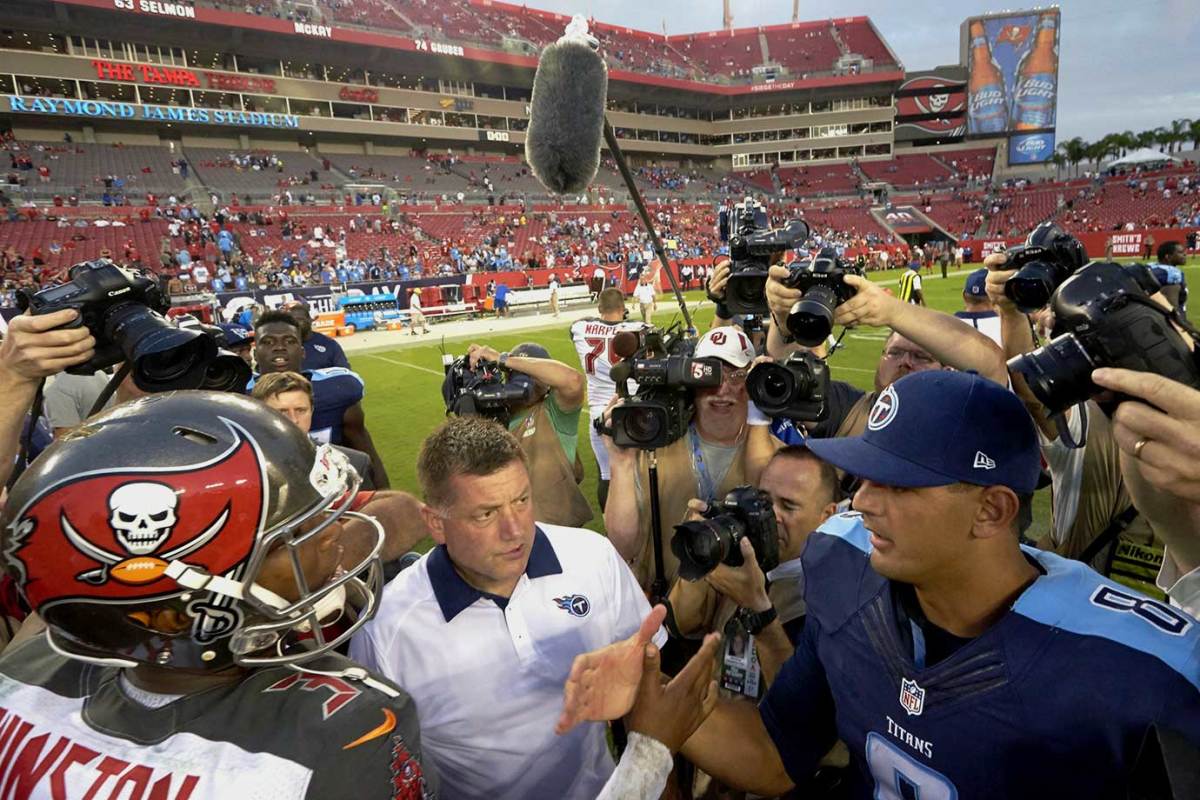
Winston faced a challenge in his first NFL start, going head-to-head with quarterback Marcus Mariota--the No. 2 overall pick in 2015--in that season’s opener. The game turned out to be a dud for Winston, whose Buccaneers fell flat as Mariota’s Titans won a 42-14 rout. Even with the home crowd behind him, Winston was simply outplayed. He went 16-of-33 for 210 yards, two touchdowns and two interceptions. Mariota, conversely, threw four touchdowns and only two incompletions. Winston would rebound from there, throwing 22 touchdowns and topping 4,000 passing yards in his rookie campaign. The Buccaneers will need more of that in order to end their near decade-long playoff drought.
Jared Goff (2016)
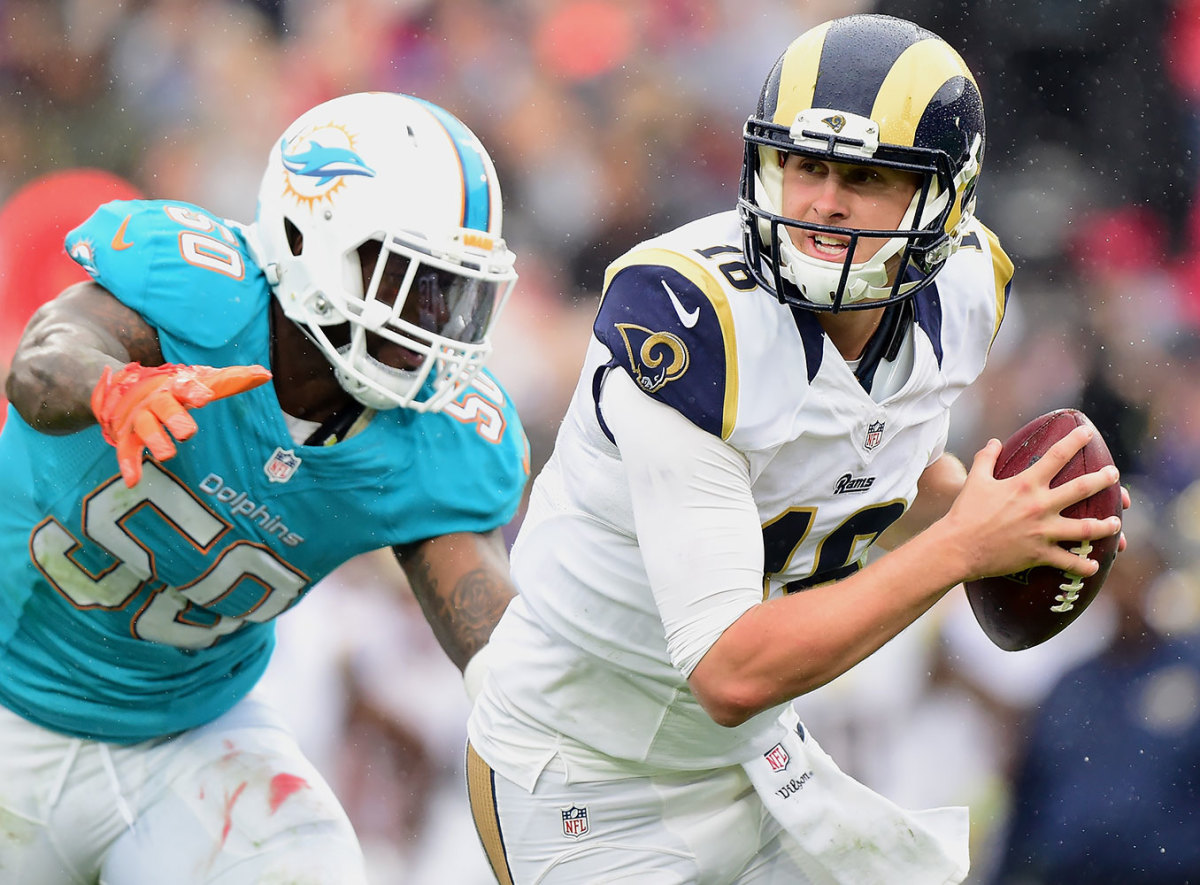
Goff went 17 of 31 for 134 yards after finally getting his chance in the 10th game of the season. But the Rams did little between Miami's two late fourth quarter touchdowns, and when Los Angeles got the ball back at its 41 with 29 seconds left, Goff moved the team only 12 yards before throwing an incompletion in the end zone as time expired and the Dolphins won 14-10.
